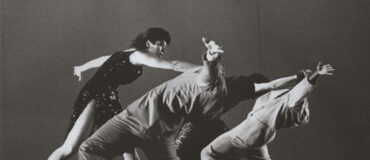By Imogen Smith and Hallie Chametzky
There is excitement in the air around dance archiving. When COVID-19 shut down live performances in 2020, archival materials were a saving grace for many artists who found they could share previous performance documentation as a way to stay engaged with their audiences. Artists all over the country are also finding that archives can inspire and inform new work, and that the archiving process can be a creative, artist-centric one. With the upcoming Dance/USA Connect: Denver, a convening grounded in archiving and preservation, there are more ways than ever to get excited about dance archives.
With all of this energy around archiving, you may be ready to dive into an archiving project of your own. Unfortunately, many dance artists and organizations have trouble finding sources of funding for archiving work, or successfully making the case for this work to funders and donors.
To offer some insight into tackling this issue, Dance/USA’s Archiving & Preservation Team spoke with three artists and organizations who have successfully secured support for dance archiving projects. The following case studies reflect diverse projects supported by different types of funding, from individual donor outreach, to small local arts councils, to large national funders.
Parangal – ACTA Living Cultures Grant
Based in San Francisco, Parangal (which means “tribute” in Tagalog) is dedicated to celebrating, preserving, and promoting Philippine heritage. Through performances, workshops, and research the company aims to serve as a bridge between Indigenous culture bearers in the Philippines and the global diaspora, connecting Filipinos to their roots and educating communities about the richness and diversity of Philippine culture.![]()

Researchers, practitioners, and culture bearers who participated in Parangal’s documentary. Photo courtesy of Parangal.
In 2021, Parangal received a Living Cultures grant from the Alliance for California Traditional Arts (ACTA) to document traditional rituals, dance, and music in the Philippines. Eric Solano, Parangal’s artistic director, says that the spark for the project came from an awareness that the elders and culture bearers from whom they learn are aging and passing away. Since 2005, Parangal has been doing research among the 110 Indigenous communities in the Philippines. Although the desire to build an archive documenting these traditions had long been percolating, there had not been a chance to make this a priority. Hearing elders say that they lacked a way to preserve traditions they want to pass on to their families and communities inspired the company to launch a documentation project, which will make these living traditions accessible for the culture-bearers, their communities, and the Filipino diaspora, and will support Parangal’s own future work.
The first project resulted in a 40-minute documentary about Sagayan, a pre-Islamic dance of the Maguindanao in Mindanao, southern Philippines. The film captures not only the dance itself but the cultural context for when, where, and why it is performed; the meaning of the terms associated with it; and the music that is used. As Indigenous traditions become endangered in the modern world, this documentation will allow Filipinos to understand their cultural heritage and ensure that future performances remain accurate and authentic. Solano has begun reaching out to libraries, museums, and film festivals to enlist partners in preserving and disseminating the documentation that Parangal is creating. Solano is also developing the documentation in book form and is incorporating it into his teaching at the University of San Francisco.

Maguindanaon dance. Photo by Amani Marina.
Parangal joined World Arts West’s Grant Accelerator program in the fall of 2020, which helped them gain skills in structuring grant narratives, while also connecting them with a cohort of peer organizations and introducing new funding opportunities. “If you never ask,” Solano says, “the answer will always be no.” Parangal had received grants from ACTA before, but these had always been for creating dance performances or workshops. Their Living Cultures proposal argued for the urgency of recording the voices of elders, and it fits in with a general shift in the organization to focus on documentation, including capturing information that lives only in the heads of Parangal’s artistic team. Their next project centers on the Indigenous music of the Yakan people from Basilan in the southern Philippines, and aims to understand social issues affecting the communities they are studying.
As the company considers the future and their goals of ensuring the preservation of traditions, Solano acknowledges that raising funds to support the work will remain challenging, however he continues to draw inspiration from Indigenous elders who have taught and trusted Parangal with their work. “One community and one project at a time we hope to be able to document/archive the treasure and legacy they leave behind for the world and generations to come.”
Chicago Dance History Project – Individual Giving Campaigns
Chicago Dance History Project (CDHP) is a digital, community-based archive focused on preserving the history of dance in Chicago through safeguarding digital archival materials, conducting oral histories, documenting dance happening in Chicago today, and more. Executive and Artistic Director Jenai Cutcher has spearheaded two successful individual giving campaigns in the past two years, though she does not have an extensive background in individual giving.

A screenshot of Jenai Cutcher (top) and Robert Battle (bottom) from the CDHP Interview Marathon. Photo courtesy of CDHP.
First was “The Interview Marathon,” a seven-hour day jam-packed with 28 interviews featuring over 40 artists, choreographers, performers, presenters, administrators, and others with notable ties to Chicago dance history. The idea for turning it into a fundraising event grew out of the sudden COVID-19 shutdowns in early 2020 which caused CDHP to pause the planning of its Gala. The organization decided to suggest audience members make a $20 donation to receive the link to the marathon livestream, which was already being planned, with optional higher donations and sponsorship opportunities.
Ultimately, Cutcher and CDHP stressed that when fundraising, putting their content front and center shows CDHP’s work in action and ensures that everyone can participate in campaigns. The Interview Marathon showed how deeply CDHP is involved and invested in their community. It also laid the groundwork for future individual giving asks: “Oftentimes, people who are directly approached for funding… have already been interviewed, or already attended an event, or at the very least have seen a clip we have produced.” Familiarity with CDHP and its role in the community makes people more likely to donate.

Lauren Grant, a dancer with the Mark Morris Dance Company, as a young child. Photos of community members in tutus were used to promote the campaign. Photo courtesy of CDHP.
The success of the Interview Marathon bolstered CDHP as they embarked on a recent, ambitious individual giving campaign. CDHP Board Member Patti Eylar and her husband, Charlie Gardner, were inspired by the year 2022 and Cutcher’s birthday on February 22nd to match up to $22,222 of donations. CDHP asked their community to give in increments of $22 or $222 (or “anything between or above”).
Over half of their donors gave $22. These small donations add up quickly, and CDHP ended up exceeding their goal by a fitting $2,002. The small level of giving “ignites a lot of different folks no matter how much is in their bank account,” says Cutcher. Plus, many individuals outside of the CDHP community decided to give, inspired by the catchy, playful hook of the repeating numbers, pictures of tutus (get it?) from the CDHP archives shared on social media, and the low bar to entry.
For outreach to donors and funders, Cutcher stresses that the most important thing is a focus on impact. How might the archival materials you are seeking to create, preserve, or document contribute to future creative processes? What might people of the future find in these materials? Showing how archives will be accessed and utilized is key in making the case to donors and funders.
No Boundaries/Dancing Digital Project – NEH Digital Humanities Grant
How can a project that was built around embodied experience live on in a digital space? This is the question that artists/scholars Gesel Mason and Rebecca Salzer are exploring with support from a National Endowment for the Humanities Digital Humanities Advancement Grant. They are collaborating to develop a prototype digital archive portal for No Boundaries: Dancing the Visions of Contemporary Black Choreographers, a “living, breathing history project” launched by Mason in 2001, in which she curated a collection of solos by African-American choreographers, performed by her in a single evening. During the fifteen-year project, Mason recorded rehearsal processes and interviews as well as performances, and she now seeks to make this evolving archive of dance works and research materials widely available digitally.

Gesel Mason and Bebe Miller rehearsing “Rain” in 2018. Photo by Jessica Cavender.
While the No Boundaries archive will ultimately be housed at the Harry Ransom Center at the University of Texas at Austin, Mason and Salzer are working to create a website that not only makes the materials accessible, but also tells the story of No Boundaries, allows the user to experience Mason’s journey, and invites researchers to discover the many other collections and histories to which the archive is connected. The digital database is being built using Collective Access, an open-source cataloging software. Salzer and Mason are working with developers to customize functionality that will support the unique resource they envision.
The NEH award is a Level II (implementation) grant, which builds on a Level I planning grant that Salzer was awarded in 2019 for Dancing Digital, an initiative “to create and facilitate more accessible, equitable, sustainable, and interconnected dance resources online.” That project, which encompassed a multi-day symposium and research into existing solutions and the dance field’s needs, concluded that there was still a need to develop new frameworks for digital dance archives. When Salzer connected with Mason, who was already thinking about how to build a digital archive for No Boundaries, they found synergy in their complementary goals.
Their proposal to the NEH highlighted several related priorities: to make accessible works that represent the marginalized and often silenced voices and stories of Black artists; to create a replicable framework that can serve as a model or inspiration to other artists; to enhance dance research by demonstrating how creative use of Linked Open Data can improve interconnectedness/searchability among multiple online dance resources; and to disseminate the learning from their process. The project easily fulfilled the NEH’s requirement that proposed work benefit the humanities, since No Boundaries was always conceived as a humanities project that went beyond performance to tell stories, unearth and preserve cultural history, and curate around the theme of resilience in African American life.

Gesel Mason and Bebe Miller rehearsing “Rain” in 2018. Photo by Jessica Cavender.
As dance artists become more deeply engaged with the digital world and ponder what it means to sustainably archive dance, projects such as the No Boundaries digital archive have great potential to forge new paths. By interrogating and resisting some of the traditional categories and systems of archival science, Mason and Salzer are remaining true to the values and vision of No Boundaries, and inviting other artists and archivists to investigate how dance can truly live within the digital realm.
Learn more about Mason and Salzer’s project at Dance/USA Connect: Denver. Mason will be the keynote speaker and will share about the inspiration, process, and impact of documenting the creative history of Black choreographers through No Boundaries. Salzer and CDHP’s Jenai Cutcher will speak on a panel about digital archives, sharing insights about creating accessible, user-friendly ways for people to engage with embodied dance history online.
There will also be an opportunity to learn about and discuss fundraising strategies for archiving projects at a roundtable with speakers who have experience both applying for funding and reviewing grant proposals, as well as opportunities for one-on-one consultations with archiving experts.
 Hallie Chametzky is the archiving specialist at Dance/USA. As a dancer and choreographer, her commitment to the preservation of dance history and legacy inform her practice, and are rooted in a deep respect for and love of the field. She was a junior fellow in the Music Division of the Library of Congress where she processed, rehoused, and documented the thousands of items in the Sophie Maslow Papers, as well as other collections of the Martha Graham Legacy Project. Her choreographic work has been shown by University Settlement, Undiscovered Countries, and The Craft, among others, and she is a current Fellow with University Settlement Performance Project. In addition to various freelance performance work, her performance experience includes Yehuda Hyman/Mystical Feet Company and Snap Soup Dance Company. Hallie is a graduate of Virginia Commonwealth University with a BFA in Dance and Choreography. In addition to her movement and archival practices, she is a writer and poet. Her writings on dance have appeared in The Brooklyn Rail, In Dance, Dance Magazine, Contact Quarterly, and First of the Month, among others.
Hallie Chametzky is the archiving specialist at Dance/USA. As a dancer and choreographer, her commitment to the preservation of dance history and legacy inform her practice, and are rooted in a deep respect for and love of the field. She was a junior fellow in the Music Division of the Library of Congress where she processed, rehoused, and documented the thousands of items in the Sophie Maslow Papers, as well as other collections of the Martha Graham Legacy Project. Her choreographic work has been shown by University Settlement, Undiscovered Countries, and The Craft, among others, and she is a current Fellow with University Settlement Performance Project. In addition to various freelance performance work, her performance experience includes Yehuda Hyman/Mystical Feet Company and Snap Soup Dance Company. Hallie is a graduate of Virginia Commonwealth University with a BFA in Dance and Choreography. In addition to her movement and archival practices, she is a writer and poet. Her writings on dance have appeared in The Brooklyn Rail, In Dance, Dance Magazine, Contact Quarterly, and First of the Month, among others.
 Imogen Smith has more than a decade of experience as a specialist in archiving dance, and is a passionate believer that preserving artistic legacies strengthens and supports the art form. As project manager for Dance Heritage Coalition (DHC), she spent five years working with dance companies and independent artists around the country to assess, organize, and digitize their collections, and leading projects to process historical dance archives and create new online dance history and archiving resources. As acting executive director of Dance Heritage Coalition, she oversaw the integration of DHC’s archiving and preservation programs into Dance/USA. Previously, she worked on oral history projects and video archives in the Jerome Robbins Dance Division of the New York Public Library for the Performing Arts, and on visual arts collections at the Brooklyn Museum and the Morgan Library & Museum. Based in New York City, she is the author of two books on film history, writes for a variety of cinema and culture publications, and is a frequent speaker on classic film.
Imogen Smith has more than a decade of experience as a specialist in archiving dance, and is a passionate believer that preserving artistic legacies strengthens and supports the art form. As project manager for Dance Heritage Coalition (DHC), she spent five years working with dance companies and independent artists around the country to assess, organize, and digitize their collections, and leading projects to process historical dance archives and create new online dance history and archiving resources. As acting executive director of Dance Heritage Coalition, she oversaw the integration of DHC’s archiving and preservation programs into Dance/USA. Previously, she worked on oral history projects and video archives in the Jerome Robbins Dance Division of the New York Public Library for the Performing Arts, and on visual arts collections at the Brooklyn Museum and the Morgan Library & Museum. Based in New York City, she is the author of two books on film history, writes for a variety of cinema and culture publications, and is a frequent speaker on classic film.
____
We accept submissions on topics relevant to the field: advocacy, artistic issues, arts policy, community building, development, employment, engagement, touring, and other topics that deal with the business of dance. We cannot publish criticism, single-company season announcements, and single-company or single artist profiles. Additionally, we welcome feedback on articles. If you have a topic that you would like to see addressed or feedback, please contact communications@danceusa.org.
Disclaimer: Opinions expressed in guest posts do not necessarily represent the viewpoints of Dance/USA.




